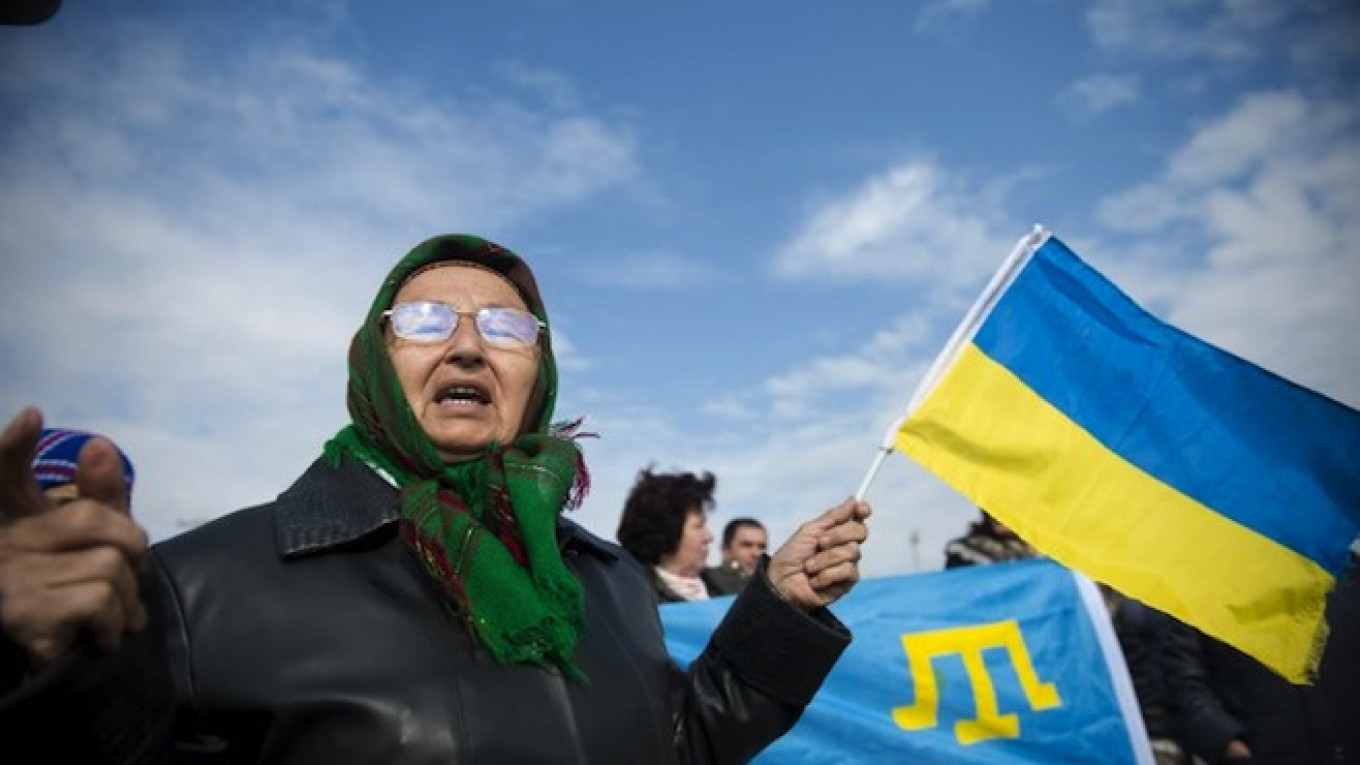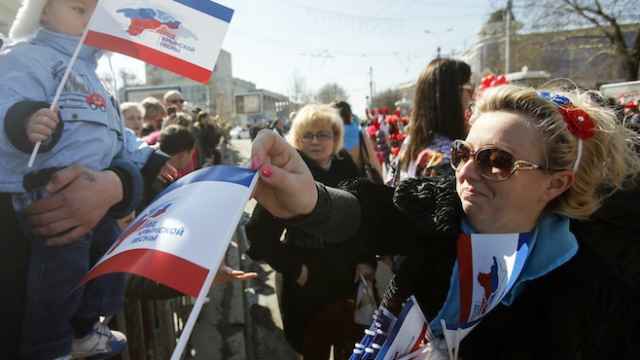Human rights watchdog Amnesty International said Wednesday that Crimean residents' rights to freedom of expression, association and assembly have all sharply suffered under Russian rule.
A report detailing human rights abuses, released Wednesday to coincide with the one-year anniversary of Crimea's annexation by Russia, notes "a rapid deterioration in the respect for human rights in the peninsula and a clampdown on dissent, targeting particularly those opposed to Russian annexation and suspected of harboring pro-Ukrainian views."
At least seven Crimean residents have been abducted in the past year, the report said, adding their fates remained unknown. Another man, a member of the Crimean Tatar community, disappeared and later turned up dead, bearing physical signs of torture, Amnesty said.
The local Tatar 200,000-strong community — which voiced strong opposition to Russia's annexation of its homeland — has been particularly singled out by the new authorities, which have silenced dissent by "issuing official 'warnings' … conducting home and office searches, and questioning people known for their pro-Ukrainian views," Amnesty said.
Non-governmental organizations have also faced harassment, according to the report, with many groups relocating or moving to mainland Ukraine because of threats to their staff. The whereabouts of at least three civil society workers remains unknown, while at least one worker was tortured and held against his will for 11 days, the report said.
Freedom of expression has similarly suffered since the annexation, Amnesty said. Local pro-Ukrainian journalists and bloggers have been coaxed into a form of self-censorship, due in part to a law on extremism that has been used to silence opposition views in mainland Russia. Two "extremism" warnings within the space of a year provides legal ground to revoke a media outlet's license.
"As a result … there is notably less pluralism in the local media, both offline and online where openly dissenting — particularly pro-Ukrainian — political views are no longer tolerated," Amnesty said. Administrative pressure has also been brought to bear on local outlets, with five radio stations losing their broadcasting licenses in the past year, according to the watchdog.
Wednesday marked a year since President Vladimir Putin declared Crimea's accession to Russia's federal fold, launching a turbulent era of Russian relations with the West that many pundits have described as a new Cold War.
After the annexation, Russian laws were introduced to the peninsula — including a controversial law on "gay propaganda" that bans the promotion of non-traditional sexual relations to minors. Freedom of assembly is also curbed by Russian law, with protesters having to give notice of their intentions to demonstrate.
While Crimean Tatars have been particularly affected by the crackdown on freedom of assembly, Amnesty noted they were by no means the only group to have suffered and that many of the peninsula's residents with pro-Ukrainian views have chosen to leave the peninsula.
The report by Amnesty is largely based on interviews conducted in Crimea in February 2015 with human rights activists, members of the Crimean Tatar community, an official from the Crimean Prosecutor's Office and the Crimean ombudsperson, Amnesty said.
Contact the author at j.monaghan@imedia.ru
A Message from The Moscow Times:
Dear readers,
We are facing unprecedented challenges. Russia's Prosecutor General's Office has designated The Moscow Times as an "undesirable" organization, criminalizing our work and putting our staff at risk of prosecution. This follows our earlier unjust labeling as a "foreign agent."
These actions are direct attempts to silence independent journalism in Russia. The authorities claim our work "discredits the decisions of the Russian leadership." We see things differently: we strive to provide accurate, unbiased reporting on Russia.
We, the journalists of The Moscow Times, refuse to be silenced. But to continue our work, we need your help.
Your support, no matter how small, makes a world of difference. If you can, please support us monthly starting from just $2. It's quick to set up, and every contribution makes a significant impact.
By supporting The Moscow Times, you're defending open, independent journalism in the face of repression. Thank you for standing with us.
Remind me later.






